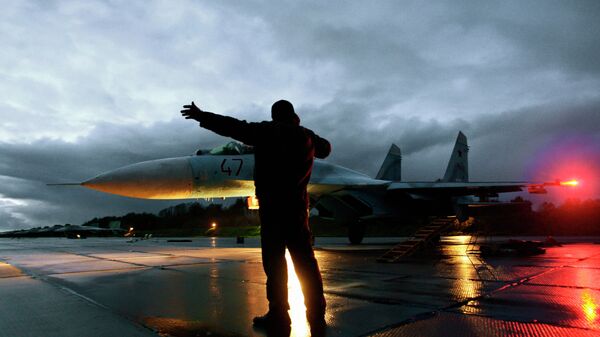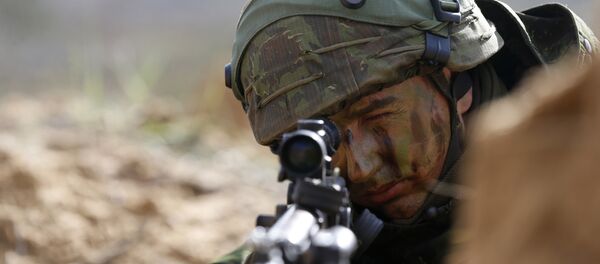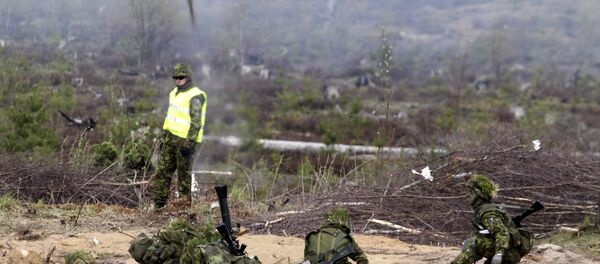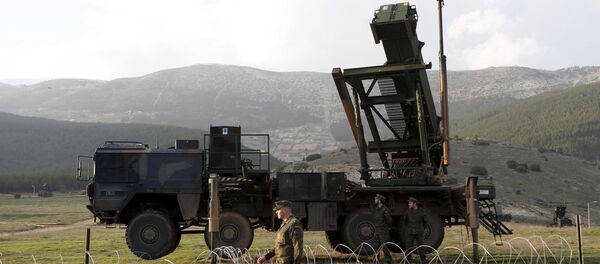On Friday, Buchanan recalls, "a Russian Su-27 did a barrel roll over a US RC-135 over the Baltic, the second time in two weeks. Also in April, the US destroyer Donald Cook, off Russia's Baltic [exclave] of Kaliningrad, was twice buzzed by Russian planes."
"Vladimir Putin's message: Keep your spy planes and ships a respectable distance away from us. Apparently, we have not received it."
"The Russians have been doing a lot of snap exercises right up against the border with a lot of troops," Work said, adding that this was "extraordinarily provocative behavior."
"But how are Russian troops deploying inside Russia 'provocative', while US troops on Russia's front porch are not?" Buchanan asks. "And before we ride this escalator up to a clash, we had best check our hole card," he adds.
The political reality, the veteran geopolitical analyst notes, is that the majority of citizens of Western European NATO countries, including Germany, Italy and France, are opposed to escalating hostilities with Russia over Eastern Europe. "If it comes to war in the Baltic, our European allies prefer that we Americans fight it."
A Mile in Putin's Shoes
Deciding to conduct a thought experiment, Buchanan suggests that while Russian President Vladimir Putin "may top the enemies list of the Beltway establishment…we should try to see the world from his point of view."
"Now," the analyst writes, "consider how the world has changed for Putin, and for Russia. By the time he turned 40, the Red Army had begun its Napoleonic retreat from Europe and his country had splintered into 15 nations. By the time he came to power," Russia, the USSR's successor, "had lost one-third of its territory and half its population. Kazakhstan, Kyrgyzstan, Tajikistan, Uzbekistan, Turkmenistan, Georgia, Armenia, and Azerbaijan," among others, "were gone."
"The Black Sea, once a Soviet lake, now had on its north shore a pro-Western Ukraine, on its eastern shore a hostile Georgia, and on its western shore two former Warsaw Pact allies, Bulgaria and Romania, being taken into NATO."
"For Russian warships in Leningrad, the trip out to the Atlantic now meant cruising past the coastline of eight NATO nations: Estonia, Latvia, Lithuania, Poland, Germany, Denmark, Norway, and Great Britain."
Moreover, "despite solemn US assurances given to Gorbachev," Putin saw NATO "incorporate all of Eastern Europe that Russia had vacated, and three former republics of the USSR itself." And now, the Russian leader also "hears a clamor from American hawks to bring three more former Soviet republics – Moldova, Georgia, and Ukraine – into a NATO alliance directed against Russia."
Outgoing NATO commander Philip Breedlove recently told the Wall Street Journal that "Russia has not accepted the hand of partnership, but has chosen a path of belligerence."
"But why should Putin see NATO's inexorable eastward march as an extended 'hand of partnership'?" Buchanan counters. If the situation were reversed, and it was Russian spy planes "patrol[ling] off Pensacola, Norfolk and San Diego, how would US F-16 pilots have reacted? If we awoke to find Mexico, Canada, Cuba, and most of South America in a military alliance against us, welcoming Russian bases and troops, would we regard that as [a] 'hand of partnership'?"
Ultimately, the commentator notes, the US is "reaping the understandable rage and resentment of the Russian people over how we exploited Moscow's retreat from empire. Did we not ourselves slap aside the hand of Russian friendship, when proffered, when we chose to embrace our 'unipolar moment', to play the 'great game' of empire and seek 'benevolent global hegemony'? If there is a second Cold War, did Russia really start it?"
A veteran political commentator, columnist and writer, Pat Buchanan is also a former White House Communications Director for the Reagan Administration, and a former Republican and Reform Party presidential candidate.




